50th ANNIVERSARY OF THE ARRIVAL OF THE CHRISTIAN SALVESEN & CO. ARCHIVE AT CRC – MARITIME TRADING AND WHALING MATERIAL
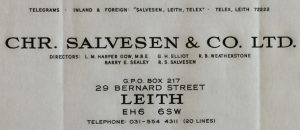
50 years ago in May 1969 former colleagues of the Centre for Research Collections had been busy collecting a large maritime trading and whaling archive from the offices of Christian Salvesen & Co. in Leith. The collection of company records was deposited on ‘permanent loan’, and would be joined by a second tranche in 1990, and a third in 2008. A gift of the entire archive to Edinburgh University Library was negotiated and signed in May 2012. That year, a small additional collection of material relating to the firm and its activities was received from Sir Gerald Elliot (1923-2018), a great-grandson of Christian Salvesen (1827-1911), the founder of the company.

Christian Salvesen and his wife Amelie, with their family, and photographed on holiday in Norway, in about 1860. The children may be (from left to right) Johan Thomas (b. 1854?), Edward Theodore (b.1857), and Frederick (b. 1855).
From Mandal, Norway, Salve Christian Fredrik Salvesen, son of a Norwegian merchant ship owner, first arrived in Scotland in the 1840s working at the Grangemouth shipbroking business owned by his brother, Johann Theodor Salvesen (1820-1865). Later on, after gaining experience on the continent, at Szczecin (then Stettin), he returned to Scotland and joined his brother again at Salvesen & Turnbull, now in Leith. On Johann’s retirement, the name changed to Turnbull, Salvesen & Co. The firm imported grain and timber, exported coal and iron, and also handled cargoes of salt and Norwegian herring. The carrying of migrants and gold prospectors to Australia was also an important trade.

Letter addressed to Christian Salvesen at the offices of Messrs Turnbull and Salvesen & Co., Leith, May 1861.
Following his brother’s early death in 1865, and after arguments with Turnbull, Salvesen went into business on his own, and his new firm, Chr. Salvesen & Co. began life on Bernard Street, Leith, in 1872. This change coincided with the advent of the steamship, and the expansion of maritime commerce with German and Baltic ports. In the 1880s, Salvesen was joined in the business by three of his sons.

For the Salvesen whaling enterprise in the South Atlantic, a subsidiary company was formed – the South Georgia Company of Leith (1909-1966), based at Leith Harbour, Stromness Bay, South Georgia.
By 1911, the year of Salvesen’s death, the firm’s vessels were trading with ports on the Baltic, in Norway and Sweden, and were servicing whaling stations in the Arctic, Iceland and the Faroe Islands. Cargo lines were also opened up between Leith, Malta, and Alexandria, and then into the Black Sea.

The Salvesen Archive contains ledgers and cash and account books in various forms, both from the firm Christian Salvesen & Co., and the important subsidiary, the South Georgia Co.
During that first decade of the 20th century, the shipping industry was in a depressed state and, globally, shipping companies made heavy losses. While the Salvesen fleet fared no better, the company’s whaling interests – now expanding as far as the Falkland Islands and South Georgia – helped it to show occasional profit. The Salvesen whaling enterprise in the waters of the South Atlantic was operated by a subsidiary company, the South Georgia Company of Leith (1909-1966), based at Leith Harbour, Stromness Bay, South Georgia.

Whale on the ‘slip’ prior to be being ‘worked’, South Georgia. From a large photograph collection in the Salvesen Archive.
Into the 20th century, whaling began to dominate Salvesen business and the firm became an industry leader just at the time when food oils and other products from the Antarctic were considered a boundless resource.

Conservation of species… far from the concern of our own time… Report on whale stock and conservation in The Times, 9 September 1918, from a correspondent in Oslo. However, the concern about conservation at that time was not so much about the various whale species themselves, but rather more about continuing access to whale oils. Conservation of whale oils, rather than conservation of whales. From a collection of newspaper cuttings albums in the Salvesen Archive.
A third Salvesen generation entered the business in the troubled economic period of the inter-war years. The firm managed to ride out these troubled times, and whaling was expanded and modernised. As stocks began to diminish however, the firm of Salvesen – whalers for nearly 70 years – was prominent in urging conservation. In 1963, they gave up whaling.

Distinctive funnel colours of the Chr. Salvesen & Co. shipping line shaded-in on the plans for the whale catchers ‘Southern Lily’ and ‘Southern Laurel’. From a collection of plans in the Salvesen Archive.
By the 1960s and 1970s, a fourth generation was still playing an important role in the firm, and over that period the company had begun to diversify its interests: home construction; canning, and cold-storage facilities; food processing; frozen and chilled food logistics; generator rental; off-shore oil support; and, road transport logistics.One of Salvesen’s acquisitions was the Buttercup Dairy cold storage business, taken over in 1964… though the company was unable to save the well-known and popular Buttercup Dairy stores.

Day Books of the Aberdeen-based Glen Line, a shipping firm owned by John Cook and Son which had been an acquired by Christian Salvesen & Co. in 1928.
In 1985, Salvesen went public on the London Stock Exchange – Christian Salvesen PLC. In 1990 the firm left shipping, and in 1997 it moved to Northampton, England. In October 2007, the Christian Salvesen board recommended a takeover of the firm by Norbert Dentressangle, the large French-based European logistics firm (the unmissable red trucks of Groupe Norbert Dentressangle are almost on a par with Eddie Stobart among the lorry-spotting community!).
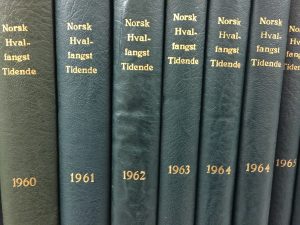
The Salvesen Archive includes many years of the ‘Norwegian Whaling Gazette’, or’ Norsk Hvalfangst Tidende’, which is rich in articles concerning the whaling industry (in Norwegian and English), and rich in contemporary whaling industry advertisements.
It was with Christian Salvesen Investments Ltd., a Groupe Norbert Dentressangle subsidiary, that the Centre for Research Collections would finally agree acquisition of the Salvesen Archive in 2012, so ending much involved contact and conversation between CRC staff and the firm in Northampton over access to the deposited collection.
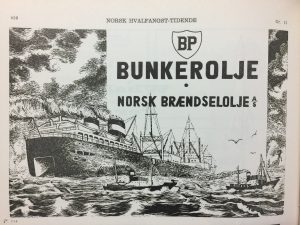
Advertisement for BP bunker fuel placed in the ‘Norwegian Whaling Gazette’.
Taking up just short of 70 metres of storage space, the archive is composed of a wide mix of material representing the firm’s early shipping interests, its whaling interests, and the firm’s later diversification. The archive includes: office ledgers; cash, accounts and invoice books; letter and day books; order and stock books; whale catch records; log books; correspondence; newspaper cuttings; photographs; and, copies of the ‘Norwegian Whaling Gazette’ and the company magazine of latter years ‘Salvesen News’.
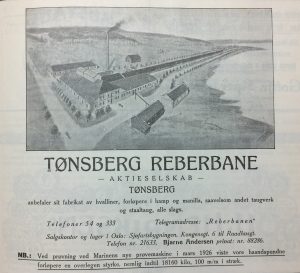
Advertisement placed in the ‘Norwegian Whaling Gazette’ by the Tønsberg ‘ropewalk’ (or reperbane), a covered pathway, where long strands of material are laid before being twisted into rope.
When the first tranche of the archive arrived at the Library in 1969, Christian Salvesen & Co. had been preparing to make a move from their offices at 29-33 Bernard Street, Leith, to larger and recently constructed premises at Citadel House, East Fettes Avenue, in Edinburgh. Doubtless the impending move had spurred the firm into disposing of unneeded company records, and the National Register of Archives for Scotland (NRAS) had surveyed and drawn up a list of material in July 1968.
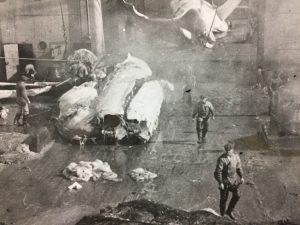
Whales being ‘worked’ on a whale factory ship. From a photograph in the Salvesen Archive photograph collection.
The NRAS list shows that the material now in the care of CRC had been located at several places: Inveralmond House, Cramond, the home of Captain Harold Keith Salvesen (1897-1970), grandson of Christian Salvesen; Attic No.1 at the firm’s offices, 29 Bernard Street, Leith; Metal cupboards at the top of the stairs at the same location; Captain H. K. Salvesen’s room in the offices at the time of the survey; and, the Operations Store Room, at the Bernard Street offices (it is worthwhile noting here too that some material in the second tranche, 1990, had been drawn from not only the headquarters in Edinburgh, but also from the abandoned whaling stations on South Georgia).

The interior of the cinema at Leith Harbour. Many of the films (in Norwegian and English) were brought out to South Georgia from Norway and the UK.
In 1968, the Library had moved into its new premises on George Square in closer proximity to the academic community and departmental offices, and from an exchange of correspondence between the Company and the Library, and between the Library and Professor Samuel Berrick Saul (1924-2016), Economic History, it can be speculated that Professor Saul may have been a prime mover in having the Salvesen Archive brought to the Library. As an economic historian, he may have been helping us to build up a business archive. Professor Saul had facilitated the commissioning of Mr Wray Vamplew, a postgraduate Economic History student, to write a history of the Company.

Painting of a whale factory ship, the ‘Southern Venturer’, by George McVey, which illustrates the cover of Wray Vamplew’s book, ‘Salvesen of Leith’.
The book, entitled Salvesen of Leith, was eventually published by the Scottish Academic Press, Edinburgh and London, 1975.
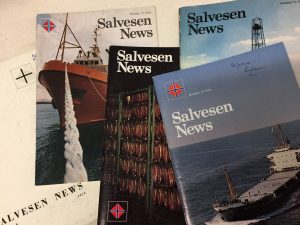
Copies of the Salvesen in-house magazine. From a run of the magazine in the Salvesen Archive.
Graeme D. Eddie, Honorary Fellow, CRC… Engaging with the Salvesen Archive of maritime trading and whaling
If you have enjoyed reading this post, check out previous ones about the Salvesen Archive…:
Cinema at the whaling stations, South Georgia August 2016
Maritime difficulties during the First World War – Christian Salvesen & Co. October 2015
Talk on the Salvesen Archive to members of the South Georgia Association November 2015
‘Empire Kinsley’ – 70th anniversary of sinking on 23 March 1945 March 2015
Pipe bombs, hurt sternframes, peas, penguins, stoways and cookery books: the Salevesen Archive July 2014
Whale hunting: New documentary for broadcast on BBC Four June 2014